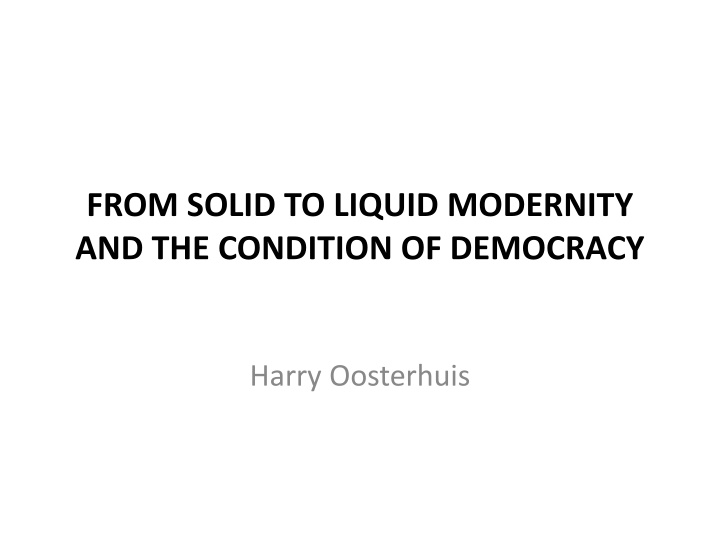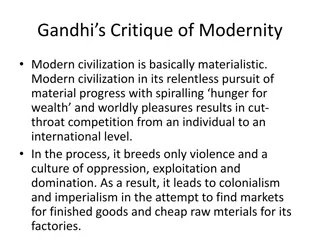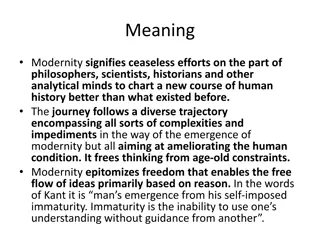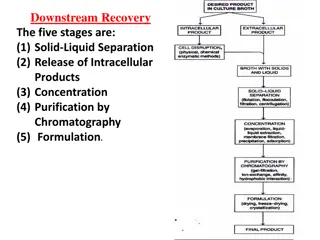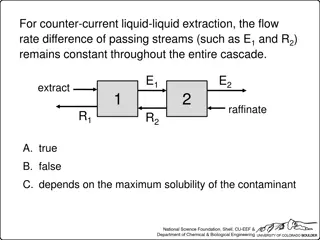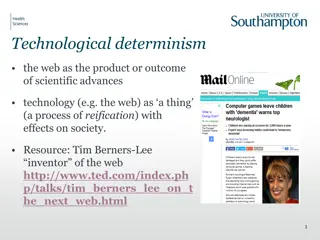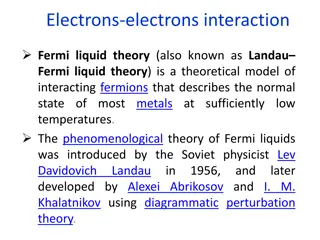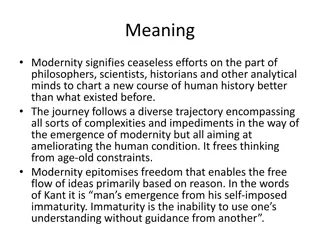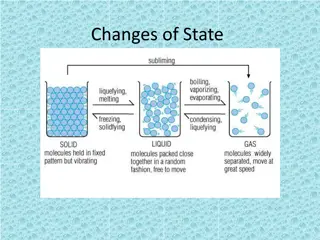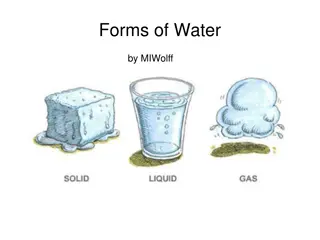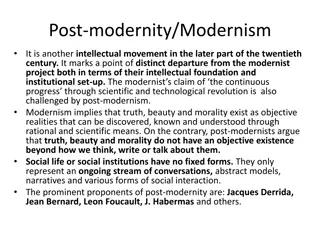Transition of Modernity: Solid to Liquid
Historical shifts from traditional to modern societies, the challenges of solid modernity, and the evolving conditions of liquid modernity, analyzing the impact on democracy, social structures, and individual roles within the changing landscape of modernization.
Download Presentation

Please find below an Image/Link to download the presentation.
The content on the website is provided AS IS for your information and personal use only. It may not be sold, licensed, or shared on other websites without obtaining consent from the author.If you encounter any issues during the download, it is possible that the publisher has removed the file from their server.
You are allowed to download the files provided on this website for personal or commercial use, subject to the condition that they are used lawfully. All files are the property of their respective owners.
The content on the website is provided AS IS for your information and personal use only. It may not be sold, licensed, or shared on other websites without obtaining consent from the author.
E N D
Presentation Transcript
FROM SOLID TO LIQUID MODERNITY AND THE CONDITION OF DEMOCRACY Harry Oosterhuis
Historical phases in ongoing process of modernisation Until late 18thcentury: Traditional/Pre-modern society Late 18thcentury 1870s: Transition from traditional to modern society (instability, uncertainty) 1870s 1940s: Shaping of solid modernity (and its derailments) ? 1940s 1980s: Consolidated solid modernity 1980s present: Liquid modernity: transitional period? (instability, uncertainty)
Disclaimer: my view of solid and liquid modernity may be subjective My interpretation may be coloured by the time in which I grew up (1960s) and my world-view was basically shaped (1970s-early 1980s) solid modernity as the standard/ normal critical view of liquid modernity ( abnormal ). For your generation, the conditions of liquid modernity may be self-evident and the normal standard.
Transition from traditional to modern society (late 18thcentury 1870s) French Revolution and Industrial Revolution destabilisation, disruption and uprooting mixed feelings about modernisation and defensive responses: All that is solid melts into air, all that is holy is profaned (Marx and Engels). Uncertainty and imbalance: old familiar social structures and ways of thinking had crumbled and new ones had not yet crystallized. Wide gap between promises of modernity and harsh political and socioeconomic realities of modern society in the making: Liberal-bourgeois democracy elitist and exclusive; parliamentary democracy and universal suffrage still contested. Laissez-faire free market capitalism leaving the growing industrial working-class without social security and causing social misery. How to deal with the disruptive social and political consequences of industrialisation and democratisation and how to organize a stable society under modern conditions?
Shaping of solid modernity (1870s 1940s) Formation of new social organisations and structures providing some security: Nation-building: modern (intervention) state and mass democracy and its institutions (parliament, bureaucracy, political parties, professionalism/expertise and technocratic arrangements, conscription armies) identification of citizens with nation-state and political ideologies. Individuals embedded in modern organisational networks of civil society: labour unions, schools, professional societies, voluntary associations and insurance companies, charitable and welfare associations, corporations in the field of health, housing and schooling, clubs for leisure and sports, broadcasting companies, churches, and newspapers.
Shaping of solid modernity (1870s 1940s) Narrowing gap between promises and social realities of modernity: Rising wages and mass-production of consumer goods. Social insurance and security arrangements and redistribution of income welfare state. Some improvement in the living-conditions of the masses. Universal suffrage + welfare state integration of the working-class in society; social-democracy (revisionism) as alternative for revolutionary Marxism/communism.
But also derailments of modernisation in the first half of the 20thcentury: Nation-state as warfare-state colonial exploitation and two destructive world wars. Modern state as a surveillance state supported by scientific-professional regimes of normalization. Ruthless gardening state totalitarianism (Fascism, Nazism, Stalinism): terror, racism, ethnic cleansing, genocide. Capitalism derailed Great Depression of 1930s. After the World War II disasters should never happen again. strong feeling that these
Heydays of solid modernity (1940s-1980s) Steady economic growth and increasing prosperity for the masses Fading of class antagonisms: growing middle class. Full employment, fixed contracts and predictable professional careers. Social-democratic approach to social and political tensions: regulation of the capitalist free market, expansion of the welfare state, health care and education. Levelling of socioeconomic and educational inequalities and further emancipation of the lower classes, women, youngsters, and other minorities. Belief in social progress through prudent social engineering and orderly planning on the basis of a carefully channeled democratic consensus, scientific and technocratic expertise, and welfare bureaucracies. Rather stable democratic constellation under leading politicians of well- organized mass parties with steady and largely passive electorates in the context of homogeneous national cultures (Weber s model of democracy). Overall (despite the threat of the Cold War): greater equality, existential security and confidence in future progress than ever before and after.
Since the 1980s liquid modernity Solid modernity 1. Economic Global free-market capitalism 2. Ideological Neoliberalism 3. Political: undermining of the nation-state as the arena of democratic decision-making and populist response Undermining of welfare democracy: Increasing precariousness and inequalities
Solid modernity Liquid modernity Stability Coherence Certainty Rational control and social design Transparency Uniformity Regularity Belief in objective knowledge Belief in progress Belief in meta-narratives Individualism balanced by the social Instability Incoherence/fragmentation Uncertainty Contingency/ chance/risk Opaqueness Multiplicity/hybridity Inconsistency Epistemological relativism The future is unpredictable Undermining of meta-narratives The priority of the individual
Global capitalism World-wide liberalized and international market of products, capital and labor Production and labor subjected to flexibility, mobility, deregulation, free competition, and constant innovation Boosting large-scale distribution and consumption of cheap mass-produced goods. Collapse of the alternative for capitalism: the demise of the communist system (1989) Neoliberal policies: deregulation and privatization, pushing back the role of the (welfare) state. Capital moves unhampered to where returns on investments are high, taxation for companies and wages of labourers are low, rules are few, laws and governments are business-friendly, labour-markets are flexible, and consuming populations are docile. Economic power more and more in the hand of global players: multinationals, banks, investment and hedge funds, stock exchanges and business lobbies, a cosmopolitan entrepreneurial and financial elite of managers, investors and shareholders from all over the world.
Neoliberalism Historical background: 1980s: attack on the welfare state in the name of economic enterprise, efficiency and growth (Margaret Thatcher and Ronald Reagan) the Social-Democratic model of social justice and egalitarianism pushed into the defensive: Costs of the welfare state through heavy taxation cannot be sustained. Welfare state makes people passive, irresponsible and dependent if not lazy, and hampers economic initiative, innovation and growth. Intrusive nanny-state should withdraw from social life and not interfere with the liberties and self-reliance of citizens. Government should not dictate to citizens what the common good is but facilitate the pursuit of their individual interests; individuals can and should fend for themselves. Belief in the superior economic efficiency of the self-regulating free market and free competition (Thatcher: Less state, more money in the pocket ) and that capitalism is fundamental for democracy liberties.
The neoliberal worldview Priority of economic and utilitarian values: efficiency, pragmatism, productivity, utility, calculation of costs and benefits, cost-effectiveness, perpetual innovation, not only in the economy itself but also in the administration of social institutions (privatization of public services) An ideology without ideals dominated by instrumental rationality as a purpose in itself and pretending to reflect the practical world as it is, excluding any other value-orientation or model for the good life or society: TINA . Return of classical liberalism: negative freedom pushing back the state through deregulation and privatization (undermining protective social arrangements of the welfare state). Individualism: idea that individuals are the masters of and fully responsible for their lives, supposedly free to shape their lives as they please, on the basis of self-interest, economic calculation, entrepreneurship and consumption with a minimum of social responsibility and solidarity.
De-socialized and de-politicized individualism Individuals should be self-sufficient, self-motivated, self-supportive and self-reliant empowered individuals as calculating and self-interested entrepreneurs of their lives, who should take responsibility for their own fate and organization of their lives, fend for themselves, go for optimal revenues and get the best out their selves for the optimal develop their talents and abilities. Individual self-determination in economic life (work and consumption) and the private domain egoistic individualism, which downplays the need for collective effort and responsibility for the public good no salvation by society and politics. (Thatcher: There is no such thing as society, there are only individuals. ) Individual responsibility for success and failure: in case of success self-pleasing ( I am excellent! ) but in case of failure distressing feeling that you can only blame yourself, that there is something wrong with you destructive effect on one s self- esteem which may trigger downward spiral people struggling with misfortunes, uncertainties, fears, and anxieties: solutions are looked for, not in a structural/collective/political remedy, but rather on the individual, psychological level of psychobabble, consciousness-raising, self-help methods and therapeutic treatment (social problems medicalized and psychologized ) or distraction through bread and games : commercial entertainment, consuming and sports.
Solid modernity: the nation-state as the arena for democracy and organizing social solidarity and justice as protective counterbalance to capitalism. Liquid modernity undermining of nation-state Global capitalism and neoliberal policies have hollowed out of the welfare state as a regulator of social-economic life and counterbalance to free- market capitalism. Separation of internationalized economic power and national political power Shift of power from national politics to international economic decision-makers beyond democratic control (governments depend on financial markets) Loss of trust in national governments and in democracy Reaction: populist dissatisfaction. Mass immigration, mobility of labour as well as the internationalisation of higher education and information Undermining of the national community as an ethnically, linguistically, culturally, and religiously homogeneous unit. National identity at stake Reaction: populism and revival of nationalism and xenophobia (undermining constitutional democracy).
Democracy under pressure The priority of (globalized) economic interests over other social and political values, but the fruits of economic growth and material affluence not fairly distributed growing socio-economic and other inequalities (and destructive consequences: pollution and climate change). Increased personal independence and (life-style and consumer) choice but based on de-socialized and de-politicized individualism, and individual freedom is far from equally accessible for all. Imbalance between individual autonomy and democratic responsibilities and social solidarity Many of the more or less self-evident safety-nets of solid modernity have been weakened The experience of existential uncertainty and social-economic insecurity. Liquid modernity fundamentally characterized by precariousness (which may feed frustration, disorientation, disillusionment and cynicism).
Increased existential precariousness: the complex interdependences in global capitalism entail uncontrollable instabilities and risks which may have consequences for individual lives Decent income not self-evident anymore: Education and occupation do not guarantee a fixed and secure job and a predicable career. Retreat of the welfare state and its social benefits in case of unemployment, disablement, sickness or old age. Sociopolitical solidarity and involvement not self-evident anymore: Decreasing membership of civil associations such as labor unions, professional corporations, and political parties. Loss of confidence in grand narratives /ideologies as guidance for the design of our society The future no longer seen in terms of progress and improvement. Continuous and rapid technological and socioeconomic change the need for endless flexibility, adaptability and mobility social relations increasingly instrumental, short-lived, passing, fleeting and fragmented. Abundance of choices, which have consequences and for which we are made personally responsible Freedom? Or stress, unrest, doubt and anxiety?
Global capitalism Growing socio-economic and cultural inequalities Since mid-1980s all over the Western world levelling of incomes, wealth, education and opportunities has stagnated or even reversed. See Thomas Piketty, Capital in the 21stCentury: global capitalism has increased the inequalities in income and wealth in the Western world. De-regulation and globalization of the economy, intensified competition, and raised standards of performance, education and flexibility have increased inequalities, not only of income and wealth, but also of education, mobility and cultural or local versus international orientation, and therefore of opportunity Growing gap between people whose qualifications are in line with the requirements of the globalized economic order and who have benefited (winners of modernity), and those whose social situation and qualifications do not meet the challenges of liquid modernity (losers of modernity: the precariat ). Reflected in opposite voting patterns: liberal, progressive and greenish, internationally oriented voters versus voters for (leftist or rightist) populist parties which are culturally conservative and often nationalist. Polarization: making democratic compromise and consensus more and more difficult.
Increasing pressure on labour and middle class Globalization + deregulation minimizing rules for economic activities, free competition, international transfer of capital and profit-making growing power of capital (investors, shareholders, bankers, entrepreneurs, managers). Labor submitted to international competition (downward pressure on wages), increasing efficiency, mobility, robotization more vulnerable position of workers: loss and transfer of blue-collar jobs + influx of cheap labour + flexibility without fixed contracts and associated social benefits, cuts on social security arrangements emergence of a new proletariat: the precariat characterized by endemic existential uncertainty and loss of trust in the liberal- democratic order and its elites. Middle-class jobs threatened by digitalization, new information technologies and outsourcing of administrative and service sector middle class undermined fear for a downward trend in their standard of living. Middle class, used to vote for centrist parties and backbone of stable democracies, losing trust in the liberal- democratic order.
Growing sociocultural fragmentation Undermining of the nation-state as arena for social cohesion/solidarity and cultural identity as a consequence of growing cultural, religious and ethnic diversity. The more diverse the population, their lifestyles, their beliefs, values and convictions, their collective past, the more difficult it is to find consensus about the public good and socioeconomic solidarity. Political controversies have partly moved from socioeconomic issues to cultural, ethnic and religious identities and moral issues (identity-politics). The feeling of native populations that national identity and social cohesion on the basis of shared traditions and attachments, habits and customs is threatened populism.
Populism: how did it come into being? Widespread discontent about growing socioeconomic insecurity and inequalities as a consequence of global capitalism and curtailing of the welfare state. Fears about mass-immigration and terrorism, growing ethnic, religious and cultural diversity, cultural globalization, European unification, loss of national identity. Exploitation of such discontent and fears by populist politicians and their argument that the established elites in the liberal- democratic and global capitalist order are responsible for these problems and tensions; and that these elites are out of touch with needs and feelings of the people and have even betrayed it.
Populism The claim of populist politicians that they directly represent and express the will of the people , thereby suggesting that they are at the forefront of true democracy. One-sided view of democracy: the rule of the (assumed) majority whose will is voiced by a strong leader, and which should have priority over constitutional rights protecting minorities. Promise of simple, firm and radical solutions which appeal to many voters: close the borders, repress Islam, expel those that do not conform to our norms, make an end to multiculturalism, restore national values and law-and-order, economic protectionism bringing back jobs, repair the loss of social security etc. Politics on the basis of emotions and rhetoric rather than policies on the basis of well-informed and rational arguments and what is wise and prudent with respect to the longer-term public interest
Putting populism in perspective Populism in itself not new, as old as democracy. Plato: democracy s inherent weakness rulers who please the wishes of the mob, regardless how unreasonable, impulsive and senseless these are. Tocqueville s warning against a form of democracy on the basis of a crude sort of majority rule and a simplistic and emotional public opinion, which is not well-informed, lacks proper reflection and which can easily be manipulated by demagogues democracy can degenerate in the tyranny of the majority and popular despotism.
Populism as inevitable consequence of mass- democracy? Universal suffrage inevitable implies populist element in democracy, whether we like it or not Those who are dissatisfied, be it for the wrong or incorrect reason, have a right to be heard. Accepting and dealing with populism as a reality, as an inevitable part of mass- democracy, while at the same time defending democracy against the possible undemocratic tendencies in populism: securing the basic institutions and arrangements which prevent direct and possibly arbitrary rule by the will of the people : - rule of law; - basic constitutional rights protecting individuals and minorities; - indirect parliamentary representation ( referenda); - professional bureaucracy and expertise for orderly implementation of political decisions.
Populism a symptom of a more general tension in mass-democracy (see Tocqueville, Max Weber and Joseph Schumpeter) What the erratic masses think, believe and feel. Need for responsible decision-making and reasonable, realistic and stable policies for the longer term on the basis of solid information, knowledge and expertise. Democratic governments facing huge and complex problems (major financial and economic crisis, global warming, mass migration). Difficulty in popular democracy for democratic leaders to communicate realistic, but unwelcome messages to their voters and to present long-term visions. Politicians acting and speaking with an eye to next elections preoccupation with the short-term, with the media and public relations, and with pleasing citizens instead of presenting realistic choices in an open and honest way and telling what they really think about what can and should be done.
Role of the media Crucial for the transparency of democracy, but the problem is that their style and the tone are not always conductive to a well-informed and nuanced understanding of issues Enhancing the tension between popular opinion and sensible policy-making The tendency in the mass-media and social media to reflect the popular culture of emotions and sensations, to focus on radical, but superficial opinions, on polarized debate, on hypes, and politicians personality and image, on politics as show and drama, instead of clarifying their ideas and convictions, and the compromises they have to make.
Disinformation, alternative truths and confirmation bias The internet has been hailed as the gateway to democracy, but there are reasons for doubt: Information- and communication-technologies can be and are used for the purpose of control and surveillance. The internet as the gateway to a plethora of disinformation, lies and sheer stupidity, of ill-founded opinions based on superficial impressions, intuitions and hear-say. More and more people don t read (good-quality) newspapers anymore and rely on internet-sites and social forums which rather confirm than question what they already believe Confirmation bias: when one s view is repeatedly affirmed and never challenged, one s opinions tend to become more entrenched and more extreme. Is this in line with the democratic principle of freedom of opinion? What about the democratic duty of being informed, of making a serious effort to understand the issues about which one ventilates one s views?
